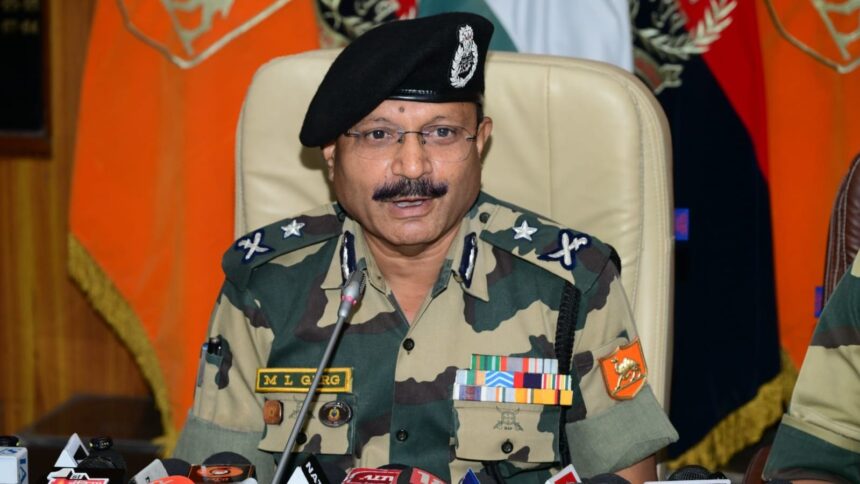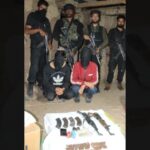Operation Sindoor significantly unsettled Pakistani security forces as India conducted targeted strikes on terrorist camps across the border. Speaking to Parul Kulshrestha, Inspector General M L Garg of the Border Security Force (Rajasthan Frontier) discussed the evolving situation along the western border and the BSF’s strategic response. Garg emphasized that India exercised restraint by not targeting civilian or military infrastructure. In contrast, Pakistan launched drones and missiles aimed at both military installations and civilian populations — many of which were successfully intercepted and neutralized in mid-air.
What were the major challenges during Operation Sindoor? Were there any unexpected hurdles?
There was nothing unexpected, except for the sheer volume of drones and missiles that Pakistan launched toward our border regions. In total, 413 drones were sent targeting military and civilian areas in Rajasthan, particularly in Sri Ganganagar, Bikaner, and Jaisalmer. All of them were successfully intercepted and neutralized. We were fully prepared for such a scenario.
What preparations were made by the BSF before Operation Sindoor was launched?
The Director General of BSF and the central government had instructed us to stay prepared — not for full-scale war but for escalating tensions between the two nations. Anti-drone systems had already been installed by the BSF, Army, and Air Force. We were on high alert, especially after the events of May 7, when Pakistan responded aggressively following our targeted strikes on terrorist camps. Our operations were precise — we avoided civilian and military infrastructure. In contrast, Pakistan responded indiscriminately, targeting civilian areas. India reserves the right to respond to terrorism, and Pakistan’s haphazard drone attacks showed a disregard for innocent lives.
You mentioned during the May 26 press conference that India did not evacuate border villages, whereas Pakistan did. Why was that?
India acted with restraint and precision. Our strikes were limited to preventing militant activity. In the event of shelling, we had bunkers ready for civilian protection, but that level of response wasn’t necessary. Pakistani drones were intercepted in the air, eliminating the need to move villagers. We prioritized security while maintaining calm.
There have been reports of sleeper cells and espionage in border villages. How is BSF addressing this issue?
Yes, there have been cases of Indian nationals in border villages acting as informants for Pakistan. With modern encrypted messaging apps, such activities are harder to detect. However, we closely monitor communications and behavior. These individuals are eventually identified and apprehended thanks to our surveillance and intelligence capabilities.
Operation Sindoor presented a war-like scenario after decades. Will BSF update its border security strategy following this?
Our long-standing preparedness helped us to manage the situation effectively. This operation has provided invaluable experience about how conflict situations may evolve. While our core strategy remains intact, we are continuously evaluating and implementing enhancements to strengthen our position further.
How does managing the Rajasthan border compare to handling situations in Kashmir or Bengal?
Each border presents unique challenges. The India-Bangladesh border sees more infiltration and narcotics smuggling, which are mostly economic crimes. Recent political changes in Bangladesh have influenced the nature of these issues. In & Kashmir, particularly along the Line of Control, ceasefire violations demand a more aggressive posture. Punjab and Rajasthan, being international borders, have seen weapon and drug drops aided by elements in Pakistan. Our approach varies by region, and we’re constantly upgrading our capabilities to deal with such threats effectively.
Are there plans to strengthen anti-drone systems on the western front to prevent narcotics smuggling?
Yes. The central government is aware of the situation and is actively working on bolstering anti-drone capabilities to curb narcotic drops along the western border.
How was the coordination between BSF, the Army, local police, and civil administration during Operation Sindoor?
The BSF held the front lines, often just 150 meters from the international border. Coordination with the Army and Air Force was seamless. Civil administration and local populations extended full support. This is the beauty of India, we all become united when there is a threat to our nation.
There was a lot of misinformation, including reports of cyberattacks, during Operation Sindoor. What’s your take?
Pakistan initially tried to downplay the operation but resorted to misinformation when the situation spiraled out of their control. Several government and civil websites faced cyber attacks. However, our cyber defence systems held firm. We ensured timely and accurate communication through official channels to prevent panic and misinformation.
What message would you like to give to the public?
Unity is our greatest strength. The public must trust the leadership and the armed forces. While some questioned Operation Sindoor, it’s important to stand together during national crises. Our forces are dedicated to protecting every citizen, and we urge people to support and believe in the nation’s efforts to maintain peace and security.







